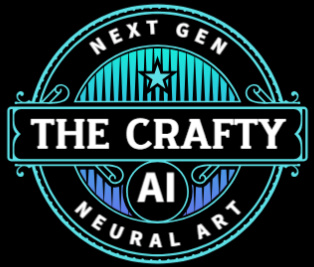www.thecraftyai.com
Ethics, copyright and responsible AI use - Part 6
AI art is powerful, fast, and fun—but it also raises important questions about ownership, authenticity, and fair use. As AI tools become more accessible, it’s essential for creators to understand the ethical and legal landscape of using them responsibly. In Part 6, we break down what’s fair, what’s legal, and what’s respectful when using AI for artistic and commercial purposes.
As AI-generated content becomes more widespread, understanding the ethics, copyright issues, and principles of responsible AI use is essential. Creators must consider the source of training data used by AI models, many of which may include copyrighted or artist-created material without explicit consent. Ethically using AI means respecting original creators, avoiding plagiarism, and being transparent when content is AI-generated. Additionally, responsible AI use involves not creating misleading, harmful, or biased imagery and adhering to platform-specific guidelines and legal frameworks. As the technology evolves, staying informed and acting with integrity ensures AI remains a tool for empowerment rather than exploitation.
🔹 Who Owns AI Art?
This is one of the most debated questions.
Generally:
You own the images you generate—if the platform’s terms of use grant you those rights (most do if you're on a paid plan).
However, you don’t own the underlying model or dataset the AI was trained on.
Each platform has its own rules. For example:.
🛑 Always read the Terms of Service of the tool you’re using.
🔹 Can I Sell or Monetize AI Art?
Yes—if you have the proper usage rights from the platform.
✅ You can:
Sell posters, prints, or digital downloads
Use AI images in client projects, branding, and marketing
Include AI-generated assets in ebooks, courses, and products
🚫 Be cautious if:
You're using AI to directly mimic copyrighted characters, logos, or celebrities
You're generating content that is misleading, offensive, or violates platform rules
🔹 Ethical Considerations in AI Art
Even if it’s legal, it’s important to ask: Is it respectful? Is it original?
Things to avoid:
Stealing artist styles intentionally (“in the style of [living artist]” is often seen as unethical.
Using AI to impersonate real people without permission (especially celebrities)
Passing off AI art as traditional hand-drawn work is misleading your audience
Uploading AI content to platforms where AI isn’t allowed (like certain art contests or galleries)
AI gives us power—but with that comes responsibility. As creators, we shape the future of how AI is used and perceived.
🔹 The Dataset Debate
Most AI models are trained on billions of images pulled from the internet, including some made by artists who didn’t consent. While these images are used for pattern learning (not direct copying), it has raised major concerns.
As a result:
Some platforms are training on licensed or opt-in datasets only
Artists are fighting for the right to opt out of training or get compensation
💡 As a user, the best thing you can do is:
Support platforms that respect creators
Use AI as a tool for inspiration and originality, not mimicry
Credit when appropriate, especially if you remix or edit AI art further
🔹 Can AI Art Be Copyrighted?
Currently, most countries do not recognize AI-generated work as eligible for traditional copyright, because it wasn’t created by a human.
However:
If you significantly modify or edit the image yourself (e.g., combining, repainting, retouching), your version may qualify.
If the image is part of a larger creative work (e.g., a book, course, or product), the full project may be protected under copyright.
Always treat AI art as part of a process rather than the final product—this gives you more creative and legal control.
🔹 A New Kind of Creativity
AI doesn’t replace artists—it changes what being a creator looks like. You become the director, the composer, the visionary.
The best way to use AI is to combine its speed with your human intention, imagination, and ethics. That’s how you stand out. That’s how you lead.
The future of AI art depends on the choices we make now. Let’s build a culture that respects creativity in all its forms.
© 2025. All rights reserved.

